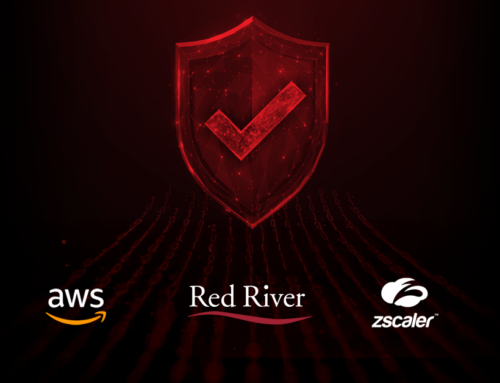
How Microsoft AI Is Powering the Next Generation of Cybersecurity
Quick Answer: Microsoft AI security tools like Microsoft Defender for Business and Security Copilot empower organizations to detect, prevent and respond to evolving cyber threats. Combined with managed cybersecurity services, these solutions deliver AI-driven automation, real-time threat analysis and expert oversight to strengthen defenses and enhance overall cybersecurity resilience for modern enterprises.
Want to learn more? Read on!
Ever since artificial intelligence burst onto the tech scene, society has been actively seeking ways to use it to make improvements to tasks, processes and other purposes. With the seemingly endless possibilities AI offers, it was inevitable that this technology would be actively – and rapidly – inserted into cybersecurity strategies.
As AI continues to be developed and fine-tuned, more and more companies are going to find ways to integrate it to augment and improve upon their existing tools, if not replace them. Microsoft Copilot is one tool businesses of all sizes are turning to for a solution. With the cutting-edge developments Microsoft is known for, its Copilot product has quickly risen in popularity, with its Security Copilot product growing steadily in its market.
Threat actors are using AI to improve the success and frequency of their attacks. Businesses, already struggling with talent shortages in the cybersecurity job market, need to identify a better way to combat them. McKinsey reported earlier this year that there has been a whopping 1,200% surge in phishing attacks since the rise of gen AI in late 2022. According to Microsoft, the tech giant has “seen password attacks more than triple to more than 4,000 per second”.
Enter AI. To improve your company’s security posture, you can use AI to battle the threatening AI tactics. This article will take a look at what AI-powered security is, the benefits it offers and why Microsoft Security Copilot is a solution many businesses are finding to be a viable option.
What Is AI in Cybersecurity?
As artificial intelligence technologies mature, it is no surprise to find it being integrated into cybersecurity. Leveraging the power of AI can go a long way toward helping to protect systems, networks and data from threats.
AI-powered cybersecurity tools use machine learning, deep learning and natural language processing to learn from new data and continuously improve their capabilities. Not only does it better itself to identify and alleviate emerging threats, but AI also improves the ability to reduce false positives, overall improving an organization’s cybersecurity posture. All of this is done in real-time, helping companies prevent incidents and/or disruptions from occurring.
Notable features of AI for security include anomaly detection, malware detection, identification of unauthorized intruders, incident summaries, fraud prevention, reporting to stakeholders and much more.
Why is There a Shift Toward AI-Powered Security?
Traditional cybersecurity tools, while built with the best technologies at the time, are no longer strong enough to combat the threats in today’s technological landscape. Your business can use AI to help facilitate a vast improvement in:
- Threat detection and intelligence
- Phishing and social engineering prevention
- Endpoint and network security
- Identity and access management
- Behavior analysis and insider threats
Essentially, AI cybersecurity tools have the capacity to analyze large volumes of data, quickly identify and detect risks, coordinate rapid responses and provide the means to give humans better decision-making capabilities when it comes to accuracy. Microsoft Security Copilot is a generative AI-powered security solution that you can assimilate into your business’s ecosystem seamlessly, utilizing a combination of AI and human expertise.
How Does Microsoft Security Copilot Fit Into Modern Cybersecurity Strategies?
Microsoft Security Copilot easily fits into today – and tomorrow’s – cybersecurity strategies. It has the ability to watch for unusual activities in system access, network behaviors and can identify other unexpected events in daily activities. Using a large language model (LLM) to accelerate threat detection, your company can improve the ability to perform incident triage and conduct investigations. The Security Copilot product essentially serves as an AI-powered assistant that your security professionals can turn to in order to help them stay on top of threats and risks.
LLMs have the capacity to process massive amounts of unstructured data, and they enhance threat detection by:
- Identifying advanced pattern recognition
- Performing behavioral analytics
- Providing context-aware analysis
Microsoft AI security tools offer their ability to help pinpoint active threats (including the consistent growth of phishing scams), provide alert prioritization of threats, suggest mitigation and remediation steps, automate tasks and, ultimately, shorten response times.
Security Copilot delivers the ability for businesses to use AI and human expertise to boost their cybersecurity posture. It easily integrates with other security products, such as Microsoft Defender and Microsoft Entra.
Benefits of Leveraging AI-Powered Cybersecurity Tools

While still relatively new, AI is already demonstrating to businesses its worth when it comes to cybersecurity tools. One 2024 study found AI-powered systems achieved substantial security improvements, finding a 98% threat detection rate and 70% reduction in incident response time. Those already positive results will most likely improve with time as these technologies continue to mature.
The benefits your company can derive from AI-powered cybersecurity tools include, but are not limited to the following.
- Proactive and predictive defense. AI is successful in identifying anomalies, detecting zero-day threats and reducing dwell time before attacks succeed.
- Faster threat detection. Along with a higher success rate in identifying issues, these are found more rapidly with AI.
- Better detection of vulnerabilities. AI for security has a strong ability to detect weaknesses in an organization’s technology ecosystem, providing security professionals with fast information so they can mitigate weaknesses.
- Allowance for automation and efficiency gains. Repetitive tasks are automated, freeing up security teams to focus on strategic initiatives and other priorities.
- Integration with Microsoft Sentinel. Utilizing AI to enhance SIEM/SOAR capabilities and automate response playbooks.
- Integration with Microsoft Defender for Business and XDR. AI correlates signals across endpoints, email, identities and cloud to detect sophisticated threats faster.
- Simplified reporting. Generative AI tools can correlate and analyze a compilation of several data sources to create straightforward reports that are easy for stakeholders across an organization to understand.
- Actionable insights. By generating information from an array of sources, such as network traffic logs, security logs and external threat feeds, hidden threat patterns can be identified, giving security teams the ability to strategically protect their organizations.
Additionally, AI tools provide a strong ability to automate tasks since they can process massive amounts of data in real time as they continuously learn. This allows for scalability as cybercriminals leverage AI to initiate attacks, helping organizations keep up with emerging threats.
The Role of Managed Cybersecurity Services
AI is dramatically and rapidly impacting the cybersecurity landscape. The “bad guys” are using AI tools of various types to commit financial and data theft, and the “good guys” are quickly realizing they need AI to assist in combating them. However, it is difficult for businesses to have the financial and professional resources to keep up the pace with these rapid changes that have come to fruition with AI in the mix.
It is important to note that, as with any technology’s advantages, there are some trade-offs. While artificial intelligence tools can detect anomalies and take action in real-time, the quality of data is a pivotal component of their success rate. If data quality deteriorates, tools can begin to overlook threats or produce an increased rate of false alarms.
This is why it is important to maintain human oversight and not solely rely upon full automation. The balance between machine and human is key to successfully providing adequate threat protection in today’s volatile cybersecurity environment. AI-powered security tools can handle specific tasks, while cybersecurity experts can review and analyze to provide an additional level of quality control. This way, they can make the judgment calls that are beyond AI’s abilities.
Many companies do not have the budget or staffing to provide adequate protection against the attacks of threat actors who are actively finding new ways to abuse AI for their nefarious intentions. Managed cybersecurity services are a solution that companies of all sizes turn to help them protect themselves. McKinsey reports that more than 90% of “AI capabilities in cybersecurity are expected to come from third-party providers”; this trend will significantly help businesses adopt cutting-edge solutions to try to keep ahead of threat actors.
A trusted partner can help your company inject AI, such as Microsoft Security Copilot, into existing security products, provide solutions, help with monitoring and support users. Red River is fully committed to assisting organizations with the implementation, management and optimization of Microsoft’s AI security stack to help bolster cybersecurity abilities. We are able to deliver 24/7 monitoring, provide compliance support and bring rapid response capabilities without expensive in-house overhead.
In Summary, Artificial Intelligence is Here to Stay
Artificial intelligence is here to stay; it is not a passing fad that will go the way of dial-up internet and other outdated technologies. If anything, AI is going to become more integrated in many aspects of society, cybersecurity notwithstanding. The reality is that the cybersecurity landscape is changing rapidly, changing at unprecedented rates. Going forward, AI will likely experience exponential growth, becoming a critical component of cybersecurity strategies.
Traditional Tools Aren’t Sufficient
Traditional cybersecurity tools are no longer strong enough to provide organizations with an adequate level of protection because they aren’t equipped to battle AI-designed cyber threats. AI can better facilitate important cybersecurity functions, such as threat detection and intelligence, prevention of active threats, endpoint and network security, access management and identifying unusual behaviors. Microsoft Security Copilot easily fulfills these functions.
Organizations are Generally Not Prepared
Accenture’s State of Cyber Resilience 2025 report found that 90% of organizations are not yet equipped to protect themselves against AI-driven cyber threats. Furthermore, 77% of organizations “lack the foundational data and AI security practices needed” to safeguard themselves. As a result, many of these organizations can benefit from turning to a skilled and experienced partner to help them navigate an increasingly rapidly changing environment in the cybersecurity space.
How Organizations Can Ready Themselves for AI
There are many options when it comes to AI-powered cybersecurity tools. Organizations must take steps to prepare themselves. This includes developing a strategy, integrating security tools (don’t operate in silos), managing data privacy, effectively handling quality of data, defining generative AI policies, consistently testing AI systems and using AI ethically.
Readying for AI cybersecurity strategies can be overwhelming, but turning to the expertise of people who routinely work with these systems can significantly increase the successful integration of AI.
A Trusted Partner Can Help Execute AI Cybersecurity Strategies
Microsoft’s AI-powered security ecosystem — combined with managed cybersecurity services from partners like Red River — is transforming how organizations detect, prevent and respond to threats. Even better, since Microsoft AI security tools already easily integrate into Microsoft 365 applications, they also work well with other existing systems and products.
Looking to Better Your Cybersecurity Posture with Microsoft AI? Red River Can Help!
The prospect of potentially overhauling your cybersecurity strategies to incorporate the threats associated with artificial intelligence can be daunting. In a fast-paced and rapidly changing cybersecurity ecosystem, many companies don’t know where to start. The good news is that, despite the fact that threat actors are exploiting AI to initiate attacks, organizations also have the tools to fight back.
Red River can help guide you through these changes and help your organization prepare itself for the current, along with getting ready for the next generation of threats. Our team of experts continuously keeps itself up to date on the latest technologies, and we are prepared to help mid-sized and large enterprises, including government contractors, deploy, manage and maximize AI solutions, including Microsoft Security Copilot.
Red River is happy to provide you with additional information or answer any questions you have about how to integrate artificial intelligence into your cybersecurity plan. We understand there are no one-size-fits-all solutions when it comes to security and can offer insight on how we can help tailor your automated solutions so you can proactively combat today – and tomorrow’s – threats.
To learn more about how Red River can assist your company in leveraging customized Microsoft cybersecurity solutions, contact us today.

written by
Corrin Jones
Corrin Jones is the Director of Digital Demand Generation. With over ten years of experience, she specializes in creating content and executing campaigns to drive growth and revenue. Connect with Corrin on LinkedIn.




